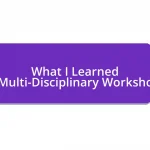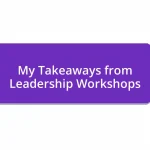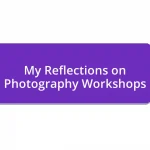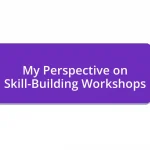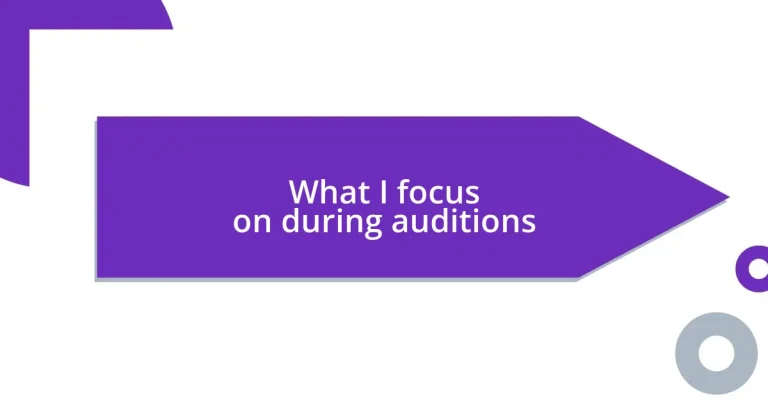Key takeaways:
- Different audition types (cold call, open auditions, self-tapes) require varied preparation and mental approaches.
- Effective preparation includes a checklist, self-care, and acknowledgment of nerves to channel anxiety into performance.
- Building character authenticity involves deep emotional connection and vulnerability, as well as understanding the character’s background.
- Post-audition reflection, gratitude towards casting teams, and engaging in other projects help manage the waiting period and foster growth.
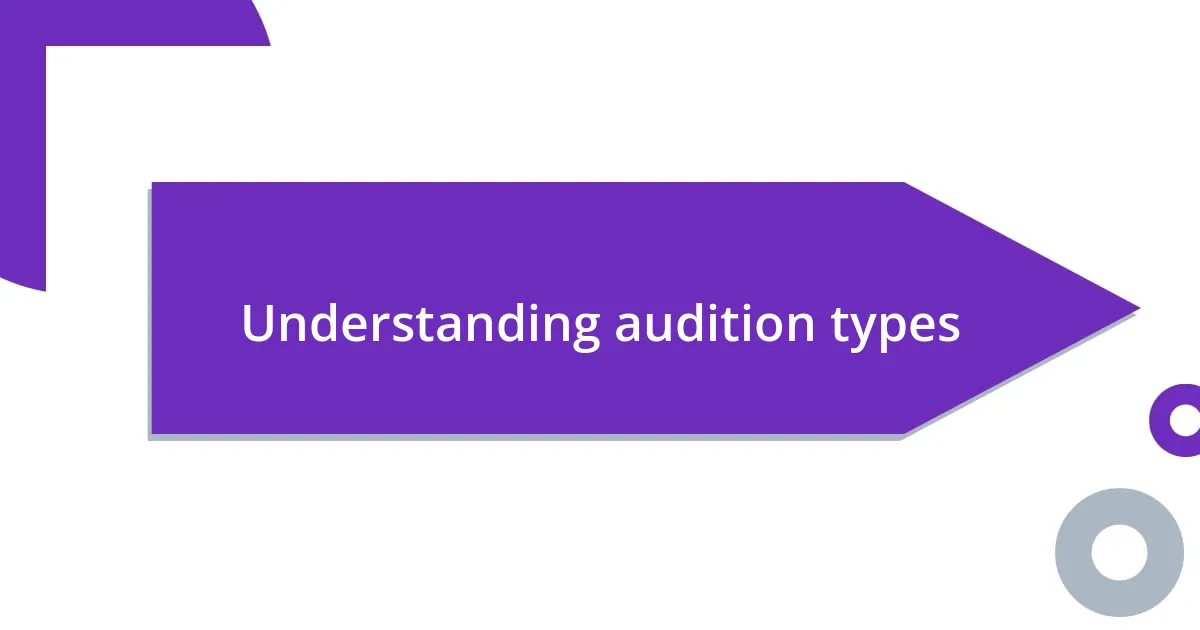
Understanding audition types
Auditions come in various forms, each designed to evaluate different aspects of a performer’s skills and versatility. For instance, I remember a cold call audition I did for a local theater. It felt challenging to present my character with no prior scripts shared and only a few minutes to impress. This scenario makes you wonder: how do you really showcase your essence in such a limited time?
Then there’s the traditional open audition, where the atmosphere is bustling with hopeful actors, each competing to stand out. I often find myself reflecting on the camaraderie that develops in such settings, despite the underlying competition. It’s intriguing to think—what makes someone memorable in a sea of talent? Is it the uniqueness of their interpretation or their ability to connect deeply with the material?
Finally, self-taped auditions have become increasingly common, giving performers the flexibility to create a polished presentation from the comfort of their homes. However, there’s an emotional aspect to consider. While it’s convenient, I sometimes miss the energy of live auditions. Does the absence of immediate feedback from casting directors make it harder to gauge your impact? I often think so, but I’ve learned to transform that uncertainty into motivation to put my best foot forward with every take.
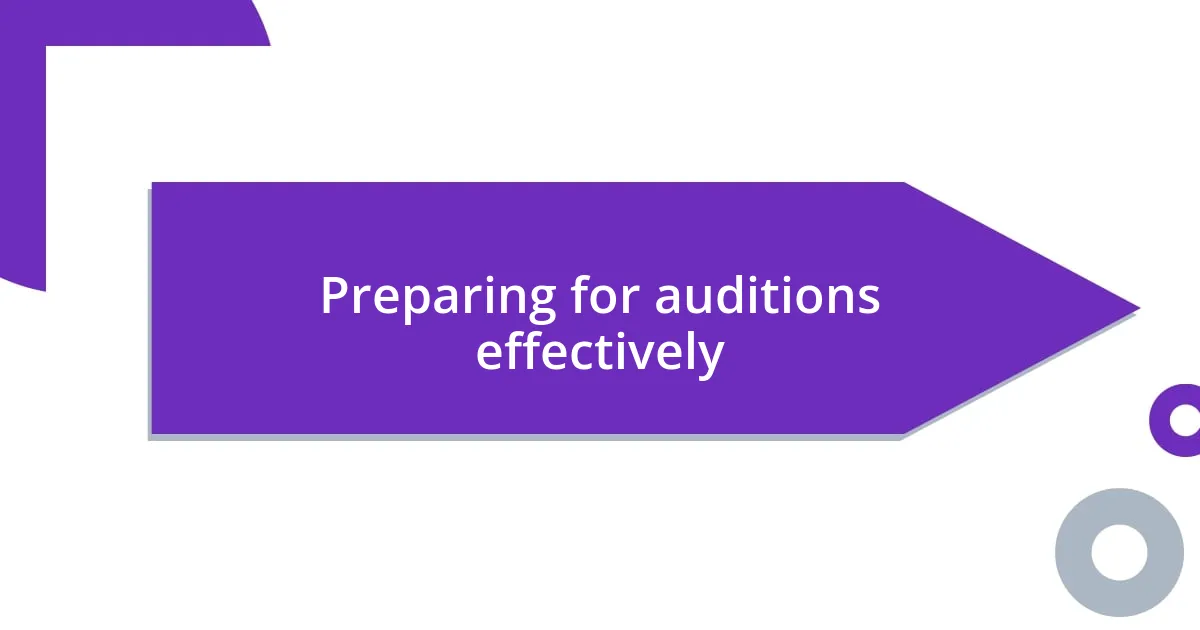
Preparing for auditions effectively
Preparing for auditions effectively requires a mix of mental and physical readiness. I always create a checklist that encompasses everything from choosing my outfit to reviewing my lines. When I prepared for a particularly nerve-wracking audition, I dedicated a full day to practice and visualization. Imagining myself on stage, embodying the character, helped center my focus and alleviate pre-audition jitters.
Here’s a quick checklist I use that could help you too:
- Research the role: Understand the character and the show to bring authenticity to your performance.
- Warm-up: Engage in vocal and physical exercises to prepare your body and voice.
- Review material: Go over the script or sides multiple times to build confidence.
- Find a quiet space: Choose an environment free from distractions to hone your craft.
- Plan your arrival: Aim to reach the audition venue early to acclimate and reduce stress.
Balancing preparation with self-care is vital. I sometimes schedule a relaxing activity, like a walk or a quick coffee break, right before heading in. These moments help me clear my mind and focus on what truly matters—showing up as my authentic self.
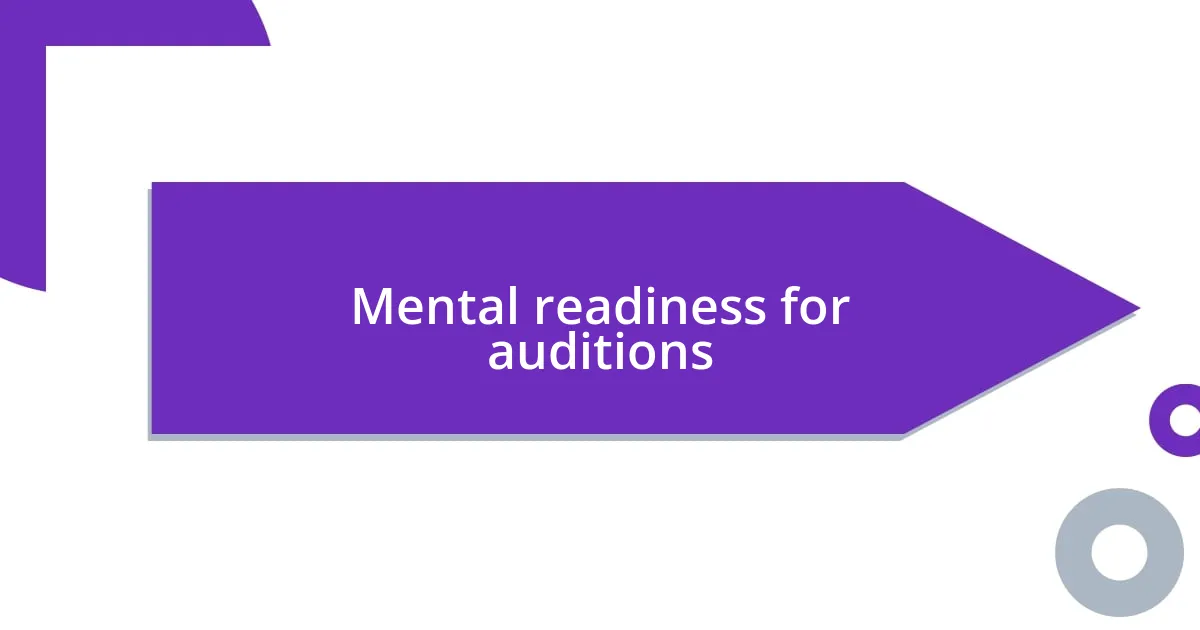
Mental readiness for auditions
When I think about mental readiness for auditions, I can’t help but emphasize the importance of self-awareness. I recall a time preparing for a critical audition where I felt a wave of anxiety washing over me. Instead of ignoring those feelings, I embraced them. I took a moment to recognize my nerves and turned them into energy for my performance. This approach not only grounded me but also allowed me to channel that emotion into the character I was portraying.
Another vital component is maintaining a positive mindset. I’ve learned that self-talk can significantly impact how I feel going into an audition. For instance, before a callback I had for a role I really wanted, I spent time in front of the mirror affirming my abilities. This practice of positive affirmations transformed my anxiety into confidence. It’s amazing how merely changing the narrative in your head can influence your mental state!
Lastly, visualization techniques have become a staple in my rehearsal routine. I vividly imagine the audition room—the lights, the casting directors, and even my emotional journey through the scene. This mental rehearsal not only prepares me for what’s to come but also instills a sense of calm. It’s as though I’ve already performed the role, allowing me to step in with a foundation of experience that feels both familiar and empowering.
| Mental Readiness Factor | Description |
|---|---|
| Self-awareness | Recognizing and embracing emotions to channel them into the performance. |
| Positive mindset | Using self-talk and affirmations to build confidence before auditions. |
| Visualization | Mental rehearsal of the audition environment to foster familiarity and reduce anxiety. |
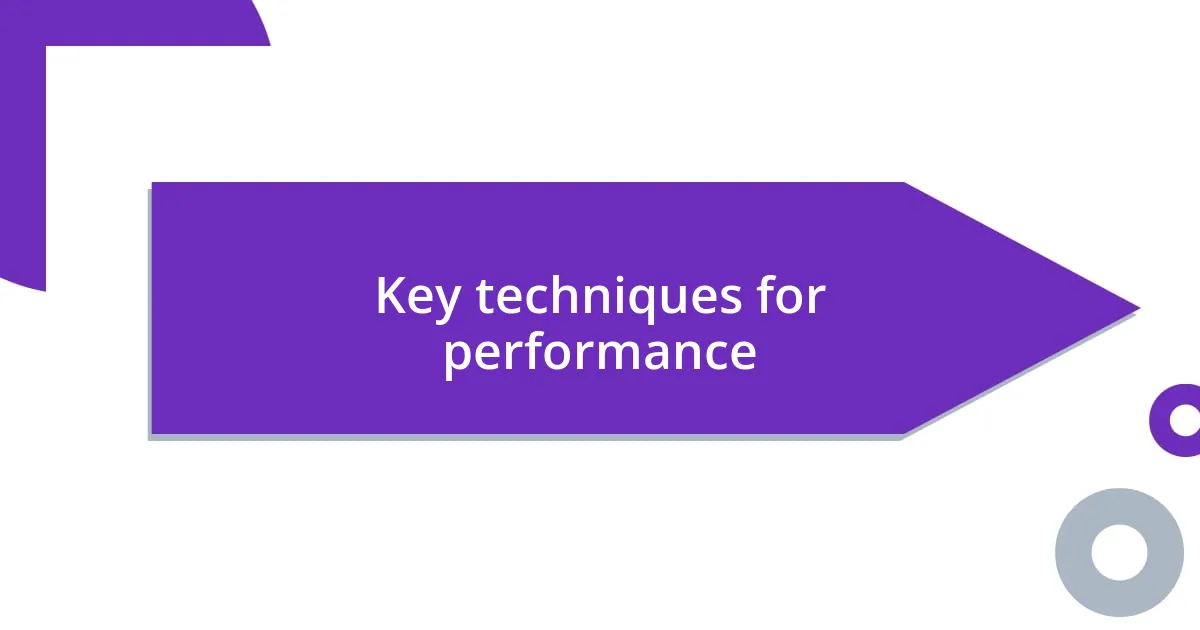
Key techniques for performance
One key technique I’ve found invaluable for performance is the power of physicality. During a crucial audition, I tapped into the character’s physical traits—how they moved, how they held themselves. It was a revelation! Moving in alignment with my character not only helped me embody the role, but it also boosted my confidence on stage. Have you ever noticed how body language can change the feel of a performance? This technique reminds me that performance isn’t just about the words; it’s also about how we express those words through our bodies.
Another important aspect is connecting emotionally with the material. I recall a time when I was auditioning for a role that mirrored my own life experiences. Instead of just reciting lines, I dug deep into my emotions, tapping into those memories. This emotional authenticity made my performance resonate. Do you consider how your personal experiences can enhance your portrayal? I believe that our individual stories can add layers of depth to our characters, making them more relatable and compelling.
Lastly, I always consider the importance of spontaneity in performance. During an audition, I’d sometimes allow myself to explore variations in delivery—slight changes in tone or timing. This spontaneity often leads to magical moments that feel fresh and alive. After all, isn’t it the unexpected moments that truly captivate an audience? I still recall a moment when a spontaneous choice I made during an audition led to a genuine reaction from the casting directors, and that instinctive decision paved the way for some unforgettable connections. Trusting yourself to go off-script can unlock a whole new level of creativity.
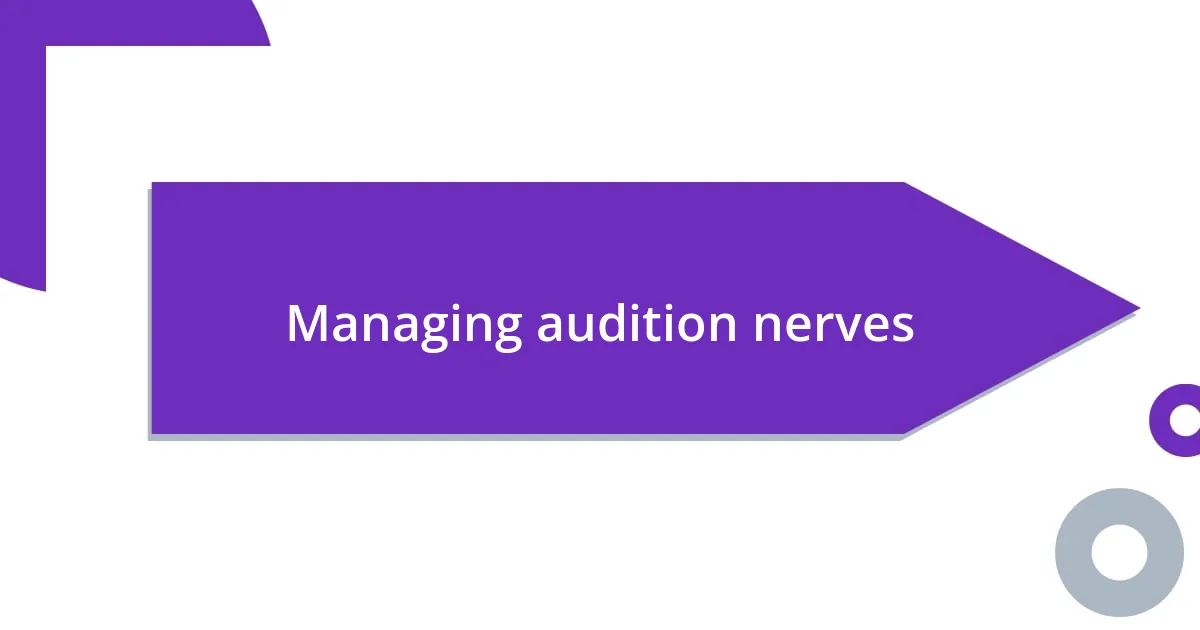
Managing audition nerves
Managing audition nerves can be a real challenge, but I’ve discovered that a few strategies can truly make a difference. Before stepping into the audition room, I often take a few deep breaths. This simple act helps me feel centered and present. I remember one time when I entered an audition absolutely trembling; I paused, inhaled deeply, and focused on my breath. It was like flipping a switch that transformed my adrenaline into a focused mindset.
I also find that connecting with my reasons for pursuing acting helps ease my anxiety. What truly fuels my passion for this art? Reflecting on moments that inspired my journey reminds me of the joy I find in storytelling. Just recently, in a particularly daunting audition, I closed my eyes and thought about my first performance as a child. It brought a smile to my face and suddenly, my nerves felt manageable.
Something else that has been effective for managing those pre-audition jitters is having a go-to mantra. I’ve developed lines like “I’m here to share, not to impress.” It sounds simple, but chanting this in my mind before stepping on stage shifts my focus from external judgments to pure expression. I’ve often shared this tip with fellow actors, and many have told me how it helped them, too. It’s amazing how re-framing the audition experience can transform those anxious feelings into eagerness to perform. Wouldn’t you agree?
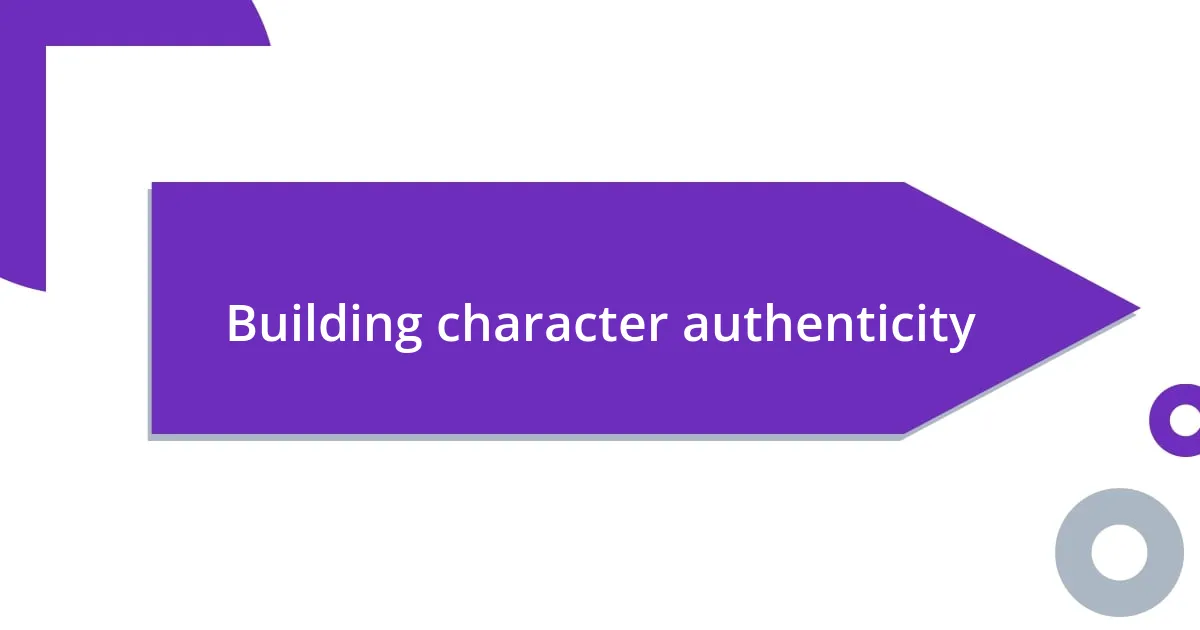
Building character authenticity
Building character authenticity requires diving deep into the essence of the role. I vividly remember an audition where I portrayed a character facing an immense moral dilemma. The moment I aligned my own beliefs with those of the character, I felt a profound shift. Have you ever experienced that moment where you genuinely connect with a character’s struggle? It not only grounded my performance but also made it more believable.
In my journey, I’ve found that understanding the character’s background is crucial. Before stepping into the shoes of a historical figure I auditioned for, I immersed myself in the world that shaped their decisions. I read books, watched documentaries, and even spoke with historians. The more layers I added to my understanding, the more authentic my portrayal felt. Isn’t it fascinating how these little details resonate with audiences? They can truly sense when an actor has put in the effort to convey genuine authenticity.
Lastly, vulnerability plays a key role in building authenticity. During one audition, I was tasked with expressing deep sorrow. Instead of forcing tears, I allowed myself to recall a personal loss, tapping into my own vulnerability. That intimate moment invited the casting directors into a true experience rather than a performance. Have you ever let your own feelings guide your portrayal? I believe that shedding our defenses creates a rawness that audiences can’t help but be drawn to. Authenticity is, in many ways, a bridge connecting the actor’s heart to the audience’s.
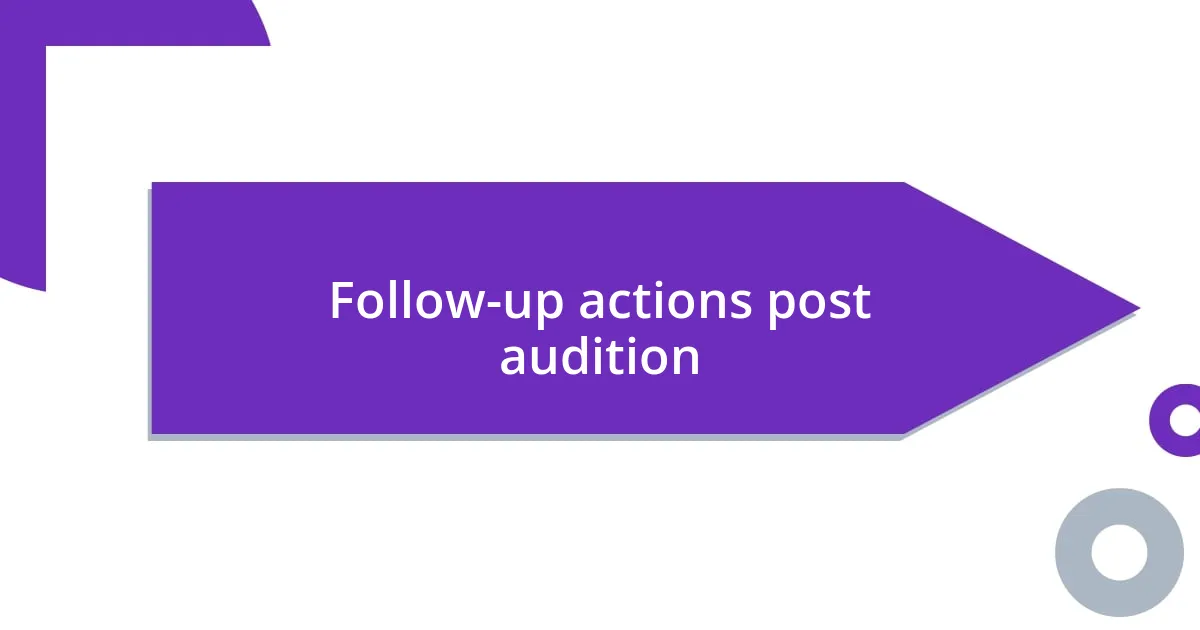
Follow-up actions post audition
After an audition, I find it essential to reflect on my performance. One method I use is journaling my thoughts about what went well and what I could improve. I remember one particularly intense audition where I felt both exhilarated and disappointed afterward. Writing about my feelings helped me clarify my experience and identify moments that resonated with me. Have you ever considered how much self-reflection can enhance your growth as an actor?
Reconnecting with the casting team is another valuable follow-up action. A simple thank-you email expressing gratitude for their time can leave a lasting impression. I once sent a heartfelt note after a challenging audition, and the response was warmth and encouragement, reminding me that the connections we build can sometimes be just as crucial as the audition itself. Don’t you think fostering those relationships could open doors for future opportunities?
Lastly, I always remind myself to give it some time. The waiting game can be tough, and it’s easy to spiral into overthinking about decisions made during the audition. I’ve found that engaging in other projects or hobbies helps distract me and keeps my spirits up. I remember one time, while waiting to hear back from a role I really wanted, I took up painting again, which not only invigorated my creativity but also kept me grounded. How do you handle the waiting period after an audition? It’s a journey that can be filled with uncertainty, yet also rich with potential for growth.
